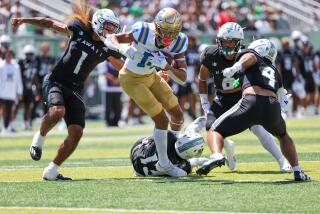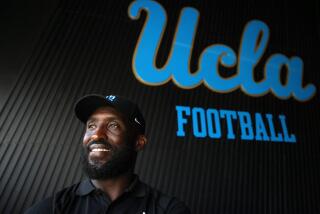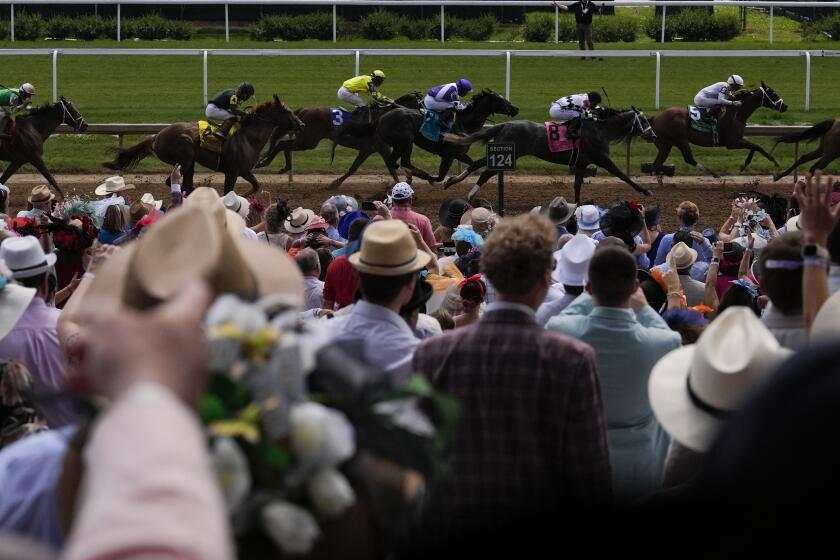COLLEGE FOOTBALL ’95 : The Gamble : Stanford Has Replaced Bill Walsh, a Super Bowl Winner and Resident Genius, With Tyrone Willingham, Who Has Never Been a Head Coach and Who Has Spent Most of His Life Overcoming Adversity
- Share via
PALO ALTO — Had it been Bill Walsh who saw Stanford wide receiver Brian Manning shooting baskets that day at the school’s Arrillaga Sports Center court, he might have waved, smiled, perhaps even cracked a joke before disappearing into his office. Then again, maybe not. You never knew with Walsh.
But Tyrone Willingham, successor to “the Genius,” isn’t Bill Walsh, which is why he stopped what he was doing, made a beeline toward a surprised Manning and challenged him to a game of H-O-R-S-E. Won too. In street clothes.
“I just froze up,” said Manning, who had the coach down, four letters to none. “I ended up choking.”
Not really. After all, Willingham has a long history of coming from behind.
He was the first African American quarterback at Jacksonville High in Jacksonville, N.C. He was among the first African Americans to integrate the city’s school system and its recreational leagues. He won letters in football and baseball at Michigan State, but only after the 5-foot-7, 140-pound Willingham had written nearly every major college program, asking for the chance to walk on. Michigan State and Toledo were the only schools that responded.
He became an assistant coach, slowly building his resume. Seventeen years, five colleges (including a stint at Stanford) and one NFL team later--and despite Walsh’s recommendation that the school hire then-offensive coordinator Terry Shea--Willingham was named head coach. He is one of only six African American head coaches in Division I-A, which includes 108 schools.
“Did Stanford take a chance?” said Cardinal Athletic Director Ted Leland, who angered Walsh by looking elsewhere. “Sure.”
So it should come as no surprise that when Willingham was through beating Manning that day, the new coach delivered a postgame lesson on the power of concentration, on the advantages of imposing your will on a situation. Willingham had done it in segregated Jacksonville, at mighty Michigan State, at skeptical Stanford and, just to prove a point, on a basketball court against the Cardinal’s best player.
“He told me how I could have . . . I mean, how I should have won it,” Manning said.
The word perseverance takes private lessons from Willingham. If he were in a prison movie, Willingham would be the guy tunneling out with a soup spoon. As it is, he already finds himself trying to find a way out from under the questions concerning his hiring, to say nothing of cleaning up the mess left from Walsh’s last two seasons, when Stanford finished 4-7 in 1993 and 3-7-1 in 1994.
The Cardinal lost three games by a total of three points a season ago and, despite leading the league in total offense, could do no better than 2-6 in the Pacific 10 standings. Blame was dispersed--some at Walsh, whose coaching style was considered too relaxed, too NFL-ish; and some at the players themselves, who occasionally broke into factions. There was the pro-Walsh vs. the anti-Walsh group, which was led by a few players who actually went to Leland and lobbied for a quarterback change. There were the freshmen vs. the seniors. There were offensive players, who had taken Walsh’s system and averaged 444.5 yards a game, complaining about the defensive unit, which couldn’t stop anybody.
Leland, who had coached under Walsh in 1978 and later engineered his return in 1992, had to do something, but what?
Walsh made it easy--sort of--by announcing his resignation last November. He would become assistant to the athletic director for special projects, which is a nice way of saying Walsh was in charge of nothing. The title was quietly dropped weeks after his resignation.
Walsh still makes appearances on behalf of the university, but says his affiliation with pro teams prevents him from doing anything for the athletic department itself. NCAA rules, or something like that.
Whatever the case, Walsh and Leland aren’t exactly the best of friends. Walsh was upset by Leland’s handling of the mini-mutiny led by several defensive players. Walsh also was annoyed by the decision not to hire Shea, especially after Shea had been brought to Stanford understanding that he was the likely successor. Anyway, as power struggles go, it wasn’t much of one.
Leland remembered Willingham from Dennis Green’s Stanford staff. When Green left for the Minnesota Vikings and took Willingham with him, Leland conducted an exit interview with the assistant coach.
“With a little more seasoning, I’d hire you as a head coach,” Leland told Willingham.
Three years later, Leland kept his promise. And then he ducked.
Tyrone, who? . . . Whaddya mean he’s never been an offensive or defensive coordinator? . . . What, you’ve got a minority quota to meet?
Leland knew Willingham’s selection wouldn’t be universally popular. There were players on the Stanford roster who had never heard of the guy. There were alums who worried about Willingham’s ability to recruit nationally, especially given Stanford’s strict admissions policy.
Leland did what he could to ease the fears. But until the Cardinal actually begins winning, Walsh’s ghost will linger.
“I don’t think we gambled hiring a black,” Leland said. “I think we gambled hiring a coach who doesn’t have as long of a resume as other guys. If we took a chance, that’s where we took a chance.”
One thing is sure: Walsh was losing his team. Stanford’s players are diplomatic about it, but it’s obvious that the strain of two consecutive losing seasons was pulling the Cardinal apart.
“I enjoyed myself immensely,” said offensive tackle Jeff Buckey, carefully choosing his words. “But I think change is good. You’re talking about Coach Walsh, the greatest mind in football. But in this case, change is good.”
Said quarterback Tim Carey: “Sometimes out on the practice field, things got a little lackadaisical with Coach Walsh. I respected Coach Walsh, but for our team, it seemed like a lot of people were unhappy. We needed a new direction, I guess.”
And this from Manning: “Bill Walsh is one of the greatest coaches ever, but he gave us a lot of leeway. A lot of guys couldn’t handle the freedom that he gave us. But it wasn’t Walsh’s fault that we lost the games we did. It boiled down to us not executing.”
Off-season workouts had become something of a joke. So had the playbook, which was the size of a Funk & Wagnall’s. Manning remembers an assistant coach laughing as he handed him the binder of plays and then saying, “Learn this.”
Other players, such as quarterback Mark Butterfield, the then-perennial backup, considered transferring, rather than remaining on Walsh’s bench.
“I didn’t think I was going to get a fair chance with Walsh,” said Butterfield, who was named this season’s starter on Tuesday. “Anyway, seven wins in the last two years is not very good.”
Willingham taps his fingertips together before answering a question about Walsh. It is awkward territory.
“That’s a very touchy situation because I know Bill,” Willingham said. “I think what happens sometimes when you lose, everyone begins to point fingers. That just tears away at the basic fabric of the situation.”
If Leland wanted a disciplinarian-upholsterer for a coach, he got one with Willingham. Manning could tell the moment Willingham walked into the room for the first team meeting.
“The tone of his voice, the glare of his eyes,” Manning said. “He meant business.”
The room fell silent. This was no easygoing legend. This was the 41-year-old son of an uneducated Carolina brick mason named Nathaniel who married a schoolteacher named Lillian. Nathaniel and Lillian raised four children, all of whom went to college and earned degrees. To pay for Tyrone’s first year at Michigan State, Nathaniel mortgaged property.
Willingham wasn’t interested in excuses, in playbook sizes, in petty infighting. This was the beginning of an opportunity he had awaited his entire life, and he wasn’t going to waste any time with pleasantries.
“It was like the first day of school,” Buckey said. “Everybody was sitting up straight, being quiet. You could hear a pin drop.”
Willingham told them they were going to win and they were going to win now, that he would settle for nothing less than a Rose Bowl appearance.
“There isn’t going to be a transition year,” he said.
He meant it too. On the first day of spring practice, usually a helmet-and-shorts workout, Willingham ordered everyone in full pads for two hours of hell. Weight room appearances became mandatory. Mistakes weren’t tolerated.
Carey bobbled a couple of snaps during an early practice. Willingham told him he’d never play at Stanford if he didn’t learn to hold onto the ball.
“I didn’t drop any after that,” Carey said.
Willingham was equally tough on himself. He still hasn’t spent a nanosecond savoring his new job.
“It didn’t seem like there was time to enjoy the moment,” he said. “I probably wouldn’t allow myself to do it anyway. It’s not about self.”
It never is with Willingham. Growing up, he would tell his brother, Jerome, of his dreams of becoming a star player. Then, without anyone having to tell him to do it, Willingham would spend hours at a time throwing a weighted football to strengthen his arm. To perfect his baseball technique, he would swing a stick until everything felt just so. And although he was small, almost no one who knew him made the mistake of fighting him. “Fast hands,” said Jerome, now an attorney.
Willingham has always been propelled by some silent inner desire. When no major program offered him a scholarship, when everyone but his family was telling him to give up the dream, Willingham simply tried harder. It goes back to something his mother told him a long time ago.
“Tyrone,” she would say, “if at the end of every day you can say, ‘I’ve done the very best I can,’ then that’s all you can do.”
Lillian Willingham, who taught school for 38 years, died in 1984, but her advice lives on. Maybe that’s why the doorstop in Tyrone’s office has this inscription: Inspire.
By the end of his junior season at Michigan State, Willingham had been named the team’s most inspirational player. Asked once how a tiny walk-on had managed to move from sixth-string quarterback to second team in less than a year, Spartan Coach Denny Stolz told reporters, “He got in our way.”
Willingham was no different as an assistant coach. In measured, even tones, he asked question after question in staff meetings. He sought perfection in everything.
At Michigan State, where he coached from 1980-82, the assistants would take a week off before fall practice started, drive north and go fishing in Little Traverse Bay on Lake Michigan. A charter boat was arranged by the chief of police in nearby Harbor Springs.
“We get out on the lake and we’re trying to figure out which pole belongs to who,” said Bob Kauffman, a former Spartan assistant who made the trip. “Finally we decide to draw lots. Sherm Lewis [now the offensive coordinator with the Green Bay Packers] says, ‘Wake me when my number comes up.’ So he goes to sleep.
“Meanwhile, Ty is looking at all the equipment on the boat. This thing had sonar, power riggers, the works. Well, Ty is involved . He’s asking questions about the fish, about the sonar. I mean, the guy is enthusiastic about lake fishing.
“We start catching some fish, mostly lake trout, about 15-18 pounds. Ty is enthusiastically involved. He is intense . Then we wake Sherm up. Sherm takes a pole and catches a 30-pound king salmon, just like that. Ty couldn’t believe it.”
Fish might not cooperate with Willingham’s work ethic, but everyone else does. In 1993, when injuries devastated the Vikings’ backfield, Willingham, who coached the running backs, squeezed two consecutive 100-yard games out of Scottie Graham, a practice-squad player who was working in a Columbus, Ohio, pharmacy when Minnesota signed him.
“Injury after injury and Tyrone never batted an eye,” said Dennis Green. “He always takes the high road. Even though you’re a third-teamer, he treats you like you’re first team. But that’s Tyrone. He’s an underdog-type fighter guy.”
Stanford needs some fight. A last-place finish in the league isn’t out of the question, nor is a 2-9 record. But don’t mention that to Willingham, unless you want to see just how fast those hands can move.
This is Willingham’s team now. A dream realized. He will never walk off a team plane wearing a Groucho Marx disguise, as Walsh once did at Washington. He will never churn out one-liners as Walsh did. It isn’t his style.
Instead, Willingham will treat every day as if he had a promise to keep, which he does. You know, do the best you can. Even if it’s only a game of H-O-R-S-E.
More to Read
Go beyond the scoreboard
Get the latest on L.A.'s teams in the daily Sports Report newsletter.
You may occasionally receive promotional content from the Los Angeles Times.










